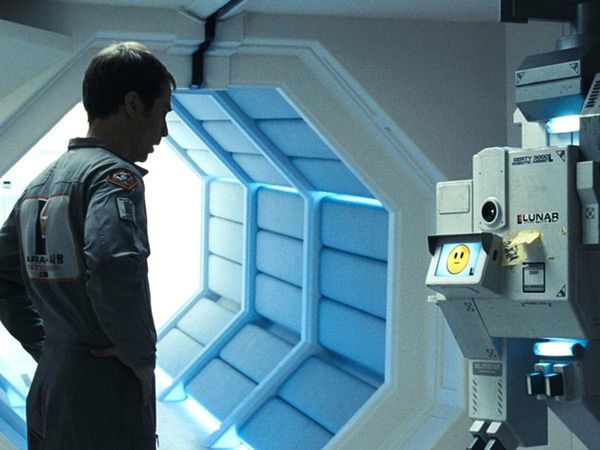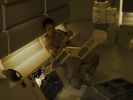Eye For Film >> Movies >> Moon (2009) Film Review

Unlike most modern sci-fi where the terror comes from without, with any philosophical trappings lost to the crash of spectacle, the threat in Duncan Jones’ masterful Moon comes from within. Soaked in the mood and minutiae of genre classics from the Seventies and early Eighties.
And Jones is bold with his references. The story of astronaut Sam Bell (Sam Rockwell) coming to the end of a three-year contract lunar mining for alternate fuel is unique, yet wholly familiar. A keen eye will pick out the Bruce Dern hippy stylings and cute little bots from Silent Running, the retro design from Outland, the lived-in blue-collar feel of Alien, the tragic romance of Tarkovsky's Solaris. Even incidental touches, such as the slightly ominous jump from interior to exterior that recalls The Thing. Rather than become mere sci-fi archive, the film incorporates the influences into its strange temporality. One that seems to flux after Sam suffers an accident on the lunar surface.

While the prologue and video messages Sam receives from his wife suggest a modern, but declining, earth, the lunar base feels fixed in another era altogether. Both regressive and progressive. Technologically advanced, but in sad withdrawal. One exacerbated by the feeling that time has no rules here. Day? Night? It’s satisfyingly unclear.
Jones orchestrates this disorientation from behind once-pure white walls, now sullied by grime. A fragile bubble, mixing classic arcade displays, Chesney Hawkes morning alarms, suspicious support robot Gerty (Kevin Spacey) and the anachronism of a vintage leather armchair. It’s here that Sam grapples with heady themes of identity, alienation and isolation. The audience are clued in gradually, as if part of some intricate celestial mystery. Subtle touches like Sam’s sensitivity to light and unexplained jumps in a video feed illuminating as much as they confound. Even we are forced to question: what are we willing to sacrifice for technological superiority? The answers are never as clear cut or as forthcoming as you might think.
It’s almost a relief to escape into the stark, empty beauty of the lunar surface. But even here our perception and perspective are being skewed. The dream-like hazy flow of images accentuated by the intricate, Meccano/Big Trak influenced model work and Clint Mansell’s brooding, siren’s lament. It’s a fiercely modern and precise score, infused with a dark, wild undercurrent that, as with Jones’ controlled direction, supports the story without overwhelming it.
Rather than go with the showier sci-fi metaphors, Jones’ oppositions are more relatable: the shift from light (the base interior) to dark (space) and the greys in between (the flayed lunar surface). Unlike the guts of the space station in 2001, which housed artificial component memory, beneath the surface of Moon is flesh and blood. The human soul on display and frittered away at the behest of commerce.
However, instead of the sinister super-corporations from Blade Runner or Alien, here the intentions are unclear. Are the backers of the lunar project evil or in service to mankind? Jones almost outdoes classics of the genre with a refusal to dish out simple answers. He respects us far too much for that. He’d rather challenge us. And it is a testament to his skills as a filmmaker that he finds a satisfactory conclusion without negating discussion.
But there’s a long way to go before that and it’s Sam Rockwell who mesmerises every step of the way. He seems to relish the challenge, taking a surface simple one-hander and distilling it to reveal myriad facets of a human personality. It’s a mini-masterpiece performance, running the gamut of emotions from complacency, fatigue and boredom to anger, inquisitiveness, fear until eventually he is little more than a child, quivering and crying out for home.
If the power of Rockwell’s performance resides in the complex, Kevin Spacey’s robot Gerty is pure simplicity. Post-it laden, emoticon winking, and resembling a piece of dental equipment, he streams unsettling cadences to full effect. There’s an obvious HAL influence, but where that AI’s motivations were grimly apparent, Jones toys with us. Right up until the final darkly humorous exchange between Gerty and Sam that manages to both humanise and dehumanise in equal measure. It’s a moment that lingers long after a fuel capsule is jettisoned, blasting off towards earth. Observed by a dying eye, it still speaks of rebirth. And in the streaking wake of its passage a hundred new questions and potentialities are born.
Reviewed on: 12 Apr 2010




















